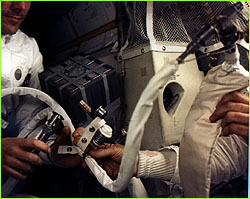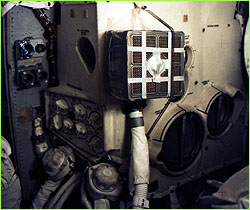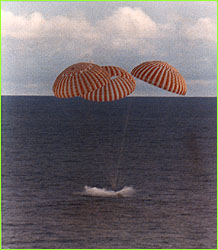
|

|

|
|
 Crew onboard Apollo 13 making carbon dioxide adapter.
Crew onboard Apollo 13 making carbon dioxide adapter.
|
Mishaps of the Space Age
1970: Apollo 13
En route to the moon, Apollo 13 suffered an explosion and lost
its main power supply. Abandoning the mission, ground
controllers in Houston then had to figure out a way to get the
three astronauts, Jim Lovell, John Swigert, and Fred Haise,
back home. Remarkably, they devised a way to send the stricken
craft, with the threesome aboard the lunar lander, around the
moon, using the latter's gravity field to shoot the spacecraft
back toward Earth.
 Carbon dioxide adapter on Apollo 13.
Carbon dioxide adapter on Apollo 13.
|
|
But the procedure was highly risky. With only a two-day
battery supply to power their four-day trip home, the crew had
to shut down all non-vital equipment, including their computer
and climate control systems. While the lander contained an
ample supply of oxygen, it did not have enough canisters of
lithium hydroxide to remove the carbon dioxide exhaled by the
crew. The main spacecraft had additional canisters, but these
wouldn't fit into the lander's housing unit. In essence, the
lives of Apollo 13's crew depended on finding a way to fit a
square peg into a round hole.
|
 Apollo 13 splashdown
Apollo 13 splashdown
|
Again, Ground Control in Houston came through. Aware of the
materials on board, they designed a makeshift adapter from the
covers of flight-plan books, plastic bags, and duct tape, and
the crew eventually returned safely to Earth.
Continue: 1971
Photos: NASA.
Q&A |
Tour of Mir |
Day in the Life
Next Space Station |
Mishaps |
Resources
Teacher's Guide
|
Transcript |
Site Map |
Terror Home
Editor's Picks
|
Previous Sites
|
Join Us/E-mail
|
TV/Web Schedule
About NOVA |
Teachers |
Site Map |
Shop |
Jobs |
Search |
To print
PBS Online |
NOVA Online |
WGBH
©
| Updated November 2000
|
|
|



 Crew onboard Apollo 13 making carbon dioxide adapter.
Crew onboard Apollo 13 making carbon dioxide adapter.
 Carbon dioxide adapter on Apollo 13.
Carbon dioxide adapter on Apollo 13.
 Apollo 13 splashdown
Apollo 13 splashdown